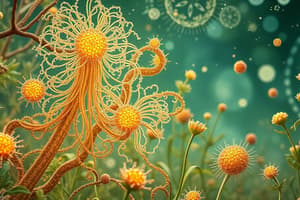Podcast
Questions and Answers
Microorganisms can only have a negative impact on our world.
Microorganisms can only have a negative impact on our world.
False (B)
To effectively manage microorganisms, scientists need to consider global cooperation.
To effectively manage microorganisms, scientists need to consider global cooperation.
True (A)
Scientists must manage each microorganism situation carelessly.
Scientists must manage each microorganism situation carelessly.
False (B)
Increasing resilience is not one of the management strategies mentioned for dealing with microorganisms.
Increasing resilience is not one of the management strategies mentioned for dealing with microorganisms.
Preventing harm from microorganisms requires no scientific understanding or managing strategies.
Preventing harm from microorganisms requires no scientific understanding or managing strategies.
Microorganisms can only be found in water and air.
Microorganisms can only be found in water and air.
Cyanobacteria play a role in creating oxygen through sunlight.
Cyanobacteria play a role in creating oxygen through sunlight.
All microorganisms are harmful and cause diseases.
All microorganisms are harmful and cause diseases.
Lactic acid bacteria are useful in producing dairy products like cheese and yogurt.
Lactic acid bacteria are useful in producing dairy products like cheese and yogurt.
Pathogenic agents never pose a threat to public health or agricultural production.
Pathogenic agents never pose a threat to public health or agricultural production.
Microorganisms always act as enemies and never as allies throughout human history.
Microorganisms always act as enemies and never as allies throughout human history.
Flashcards are hidden until you start studying
Study Notes
Understanding Micro Organizations
Microorganisms have played a significant role throughout human history, often serving as both allies and enemies. These tiny living organisms can range from bacteria and viruses to fungi and protists. They are microscopic creatures that thrive everywhere - water, air, soil, plants, animals, and even inside humans. Their size makes them unique and they form the base of most ecosystems on our planet. However, some of these microorganisms also cause disease and other problems we face today. Here is what you need to know about the good and bad aspects of microorganisms.
Benefits of Microorganisms
The benefits of microorganisms far outweigh their downfalls when it comes to ecology. For example, photosynthetic cyanobacteria create oxygen through sunlight. Fungi help with decomposition and nutrient cycling as well. Some useful microorganisms like lactic acid bacteria produce dairy products such as cheese and yogurt. Others make food ferment faster which helps preserve its freshness. In the medical field too, some microorganisms help cure certain diseases, while others serve as models for studying complex biological processes.
Negative Aspects of Microorganisms
However, there are instances where microorganisms play negative roles. Certain pathogenic agents cause infectious diseases, threaten public health, and limit agricultural production. Pathogenic microbes can transmit illnesses directly between people and between species. Bacterial plagues caused by Yersinia pestis spread over large geographic areas, causing devastating epidemics.
Management Strategies
Since many beneficial microorganisms exist alongside potentially harmful ones, scientists must manage each situation carefully. This management might involve controlling, manipulating, eliminating, tolerating, exploiting, reducing risk, increasing resilience, or maintaining assets. Global cooperation is key since microorganism threats cross borders easily nowadays.
In conclusion, microorganisms play vital roles in our world whether positive or negative. Knowledge about them will help us prevent harm while making full use of their useful qualities. Scientific understanding and managing strategies are essential to maximize the benefits while minimizing any potential damage from microorganisms.
Studying That Suits You
Use AI to generate personalized quizzes and flashcards to suit your learning preferences.




